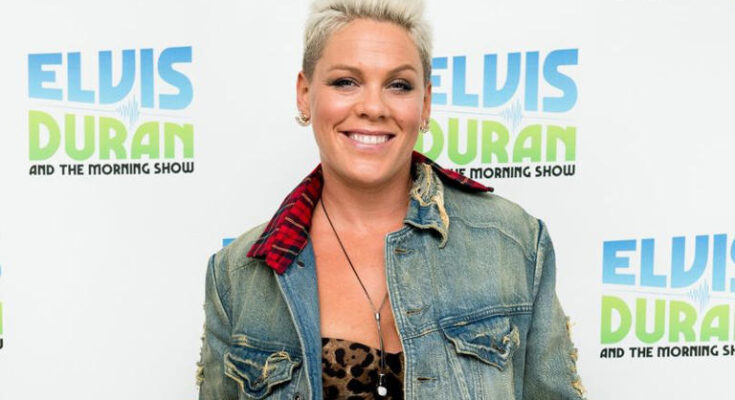Pink admirers are shocked to discover the obscene connotation of the singer’s stage name.
For decades, Alecia Beth Moore—better known to the world by her stage name P!nk—has captivated audiences with her powerhouse vocals, raw authenticity, and a defiant spirit that made her stand out in an industry saturated with polished pop personas. But recently, many admirers were taken aback when they discovered that her famous moniker, “P!nk,” carries a far more risqué and even obscene connotation than they had ever realized. While most fans associated the name with femininity, rebellion, or even something as simple as her favorite color, the truth behind it is both more layered and more provocative.
The shock first spread across social media when long-time fans stumbled upon old interviews in which P!nk herself explained the name’s origin. The revelation caught newer listeners off guard, as many were too young to have followed her early career or had assumed the nickname was simply a playful twist on her edgy persona. The obscene undertones of “P!nk,” however, have now become a hot topic, sparking heated debates, laughter, and a mix of admiration and discomfort.
To understand the controversy, one must go back to P!nk’s formative years in the late 1990s. At the time, she was a rebellious teenager breaking into the industry, hungry to set herself apart from the bubblegum pop stars dominating the charts. She chose “Pink,” stylized as P!nk, as a name that carried multiple personal meanings. On the surface, it seemed playful, fun, and even ironic for someone who often leaned toward a punk aesthetic rather than the traditionally “girly” color. Yet underneath the playful surface, there was a cruder, more adult layer to the moniker—one linked to a nickname given to her by friends and to an inside joke referencing an intimate body part.
This revelation is what left many admirers shocked. Fans who had always seen P!nk as an empowering, fierce role model suddenly found themselves grappling with the bawdy humor tied to her stage name. “I grew up thinking P!nk called herself that because she liked the color,” one fan posted on Twitter. “Now I find out it’s got this X-rated origin story, and I don’t know whether to laugh or cry.” Another admirer wrote, “Honestly, it makes me respect her even more. Only P!nk could take a dirty joke and turn it into an iconic brand.”
The obscene connotation stems partly from a long-standing tradition in rock and pop music of pushing boundaries with provocative names and imagery. From Prince’s flirtation with explicit symbolism to Madonna’s embrace of sexuality as performance, artists have often blurred the line between artistry and taboo. P!nk, in her own way, carved her path within that tradition. By adopting a name with risqué undertones, she signaled early in her career that she was not afraid to challenge norms or shock audiences.
Interestingly, this revelation has not damaged her reputation—in fact, for many fans, it has reinforced the very qualities they admire in her. P!nk has always thrived on authenticity and honesty, often using her music to confront uncomfortable truths about love, pain, and personal growth. To learn that her stage name itself carries a hidden, almost scandalous meaning feels like a natural extension of her unapologetic persona.
The story behind “P!nk” also highlights an important part of her artistry: duality. On one hand, the name is a nod to youthful innocence and something seemingly simple. On the other, it embodies a more adult, rebellious, and even outrageous energy. This balance mirrors her music and image throughout her career. She has seamlessly shifted from tender ballads like “Just Give Me a Reason” to explosive anthems such as “So What” or “Raise Your Glass.” Similarly, the name “P!nk” can be seen as both soft and shocking, innocent and obscene.
The recent rediscovery of the name’s origins has also led to cultural conversations about how female artists are perceived versus their male counterparts. Many fans pointed out that if a male artist had adopted a stage name with explicit undertones, it might have been dismissed as juvenile or vulgar. But P!nk managed to reframe it into something powerful, reclaiming the humor and defiance in it. This ability to redefine meaning is a testament to her strength as a cultural figure.
Media outlets have also jumped on the revelation, running stories that range from amused to analytical. Headlines like “Fans Discover the NSFW Secret Behind P!nk’s Name” or “The Dirty Joke That Became a Pop Icon’s Identity” reflect both the humor and the intrigue of the situation. Entertainment commentators argue that this discovery adds yet another fascinating layer to the mythology of P!nk’s career. By embracing an obscene connotation and turning it into a global brand, she has demonstrated the power of owning one’s story—even the messy or risqué parts.
For some fans, the news has sparked nostalgia. Older listeners recall her early days when she first revealed the cheekier aspects of her name’s origin, and they marvel at how this “inside joke” has grown into one of the most recognizable brands in music. Newer fans, however, are experiencing it as a revelation, which has led to a wave of viral memes and jokes online. TikTok, Twitter, and Instagram have been flooded with reactions, ranging from “P!nk just broke my childhood” to “Of course she named herself after something dirty—this is exactly the P!nk energy we know and love.”
Ultimately, this discovery underscores why P!nk remains such a compelling figure in the world of music. She has never been afraid of controversy, never hidden from uncomfortable truths, and never conformed to the sanitized image often expected of female pop stars. Instead, she has leaned into her uniqueness, even when it shocked people. That her stage name carries an obscene connotation is perfectly in line with the rebellious, fearless spirit that has defined her career.
The fact that P!nk’s admirers are shocked says less about her and more about how audiences often sanitize or simplify their idols over time. We tend to forget that artists like P!nk are complex, multifaceted individuals who refuse to fit into neat boxes. This recent wave of surprise is, in many ways, a reminder of her refusal to conform—even down to the name she chose to present to the world.
As the conversation continues to swirl online, one thing is clear: P!nk has once again sparked cultural dialogue, proving that even her name carries a story worth telling. And true to form, she has not apologized or backpedaled. Instead, she has leaned into the conversation with humor, reminding everyone that she has always been about honesty, even when it makes people uncomfortable.
For fans old and new, the obscene origins of “P!nk” may be surprising, even shocking. But they also reinforce exactly what has made her an icon: her willingness to be bold, to challenge expectations, and to embrace every side of herself—colorful, raw, and unfiltered.



